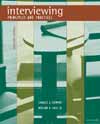

 Interviewing: Principles and Practices, 11/e The Probing Interview Mixed Quiz |
 2006 McGraw-Hill Higher Education
2006 McGraw-Hill Higher EducationAny use is subject to the Terms of Use and Privacy Policy.
McGraw-Hill Higher Education is one of the many fine businesses of The McGraw-Hill Companies.